2010.10.27[Event Reports]
10/27 (Wed) Competition Section ŌĆ£POST CARD" Press Conference: Notes & Quotes

Date & Time: October 27th (Wednesday), from 15:00 @Movie Café
Appearance: Kaneto Shindo(director/screenplay/original story), Etsushi Toyokawa (actor), Shinobu Otake (actress)
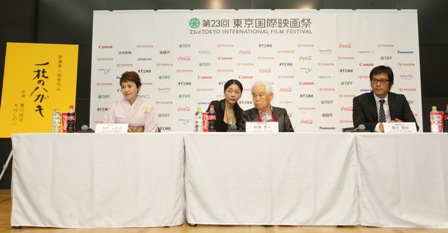
Here are some notes and quotes:
Kaneto Shindo (KS): Thank you for coming to our press conference today.
Etsushi Toyokawa (ET): I am very happy to be able to participate in the Tokyo International Film Festival.
Shinobu Otake (SO): I'm grateful that I was able to take part in yet another Shindo film.
Q: I understand that there is damage war brings to peopleŌĆÖs hearts as well as the power it brings. What is your impression upon completing this film?
KS: The theme of this film is that under no circumstance should we start a war as it only kills people. For example if a soldier goes to war and is killed, his wife will be widowed. Moreover, if that soldier was central to the family, that family would be completely devastated. That is the tragedy of war I wanted to depict in this movie. As well, as I have been to war myself, I wanted to draw upon my own experience to write out this story.
Q: I believe you said that you plan to make this movie your final piece, but do you plan to shoot any more?
KS: I plan to make this my last film as I am getting weaker and it would be difficult to continue. That's why I declared that this would be my final film.
Shindo went to war when he was 32 years old. He talked about his experience up to the point when the war ended. He was first called to the cleaning crew. After the soldiers finished their duty, they would do a drawing to decide on who would go to actual battle. In this way, 94 out of 100 soldiers lost their lives and Shindo was one of the 6 who made it out alive.
KS: The souls of the 94 soldiers have been with me all the time and I accepted it as a way of life. After I founded my own independent movie production, I shot films the way I wanted toŌĆöbased on how I wanted to make a movie. Yet, one cannot shoot a film in tears, remembering the past days, so I swore to myself to keep my head high and to continue making movies come hell or high water. Of course I have shed tearsŌĆöthere were moments when I felt crushed to the ground, as if groveling to make films. The next thing I knew, 60 years had passed making movies in this manner and I am now 98 years old. I feel that this is my limit in moviemaking and this will be my last piece. Yet, the only thing I have in my life is films so I will live alongside movies for the rest of what remains ahead of me. I am a humble filmmaker who made a humble movie. I ask for your kind support toward my film.
Q: As a survivor of war, how do you see the world?
KS: I hear news about how war must be stopped for a country to develop, or that a country will not be fully established otherwise. As well, there are voices against the possession of nuclear warheads. This is all the obvious. In my opinion,
private soldiers are out in the battlefield, not high ranking members of the army. This is precisely what I want to say to the world. Many of the private soldiers come from poor families barely able to make a decent living, and so if these soldiers die, their families will be crushed. That is what war is all about and that is my message. I'd like for the world to be more aware of nuclear warheads and power plants. I speak of this out of experience and so will speak with confidence. I have reflected all of these thoughts into my film.
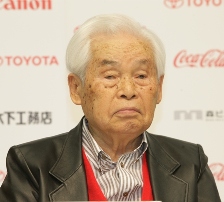
ET: Looking at the present world, it seems like the world hasn't changed much when comparing the early 1900s with the early 2000s. It's true that 60 years have passed since the end of WWII and fortunately Japan is not involved in any war or internal conflicts. Yet, if you look at the world there are wars and political or religious conflicts in many parts, which is something the world has already seen a century ago. In this sense, nothing has changedŌĆ”The victims of war are the innocent citizens; women, children or those who have lost a family member, or even an entire family. The reality that the perpetrators of war never die but that civilians do is a fact that probably hasn't changed at all. In this sense, I am sure this movie will reach out to people in many places of the world.

SO: I am in complete line with the director and Mr. Toyokawa. The director earlier said that he was a humble filmmaker who made a humble film and I see my job as to express his thoughts through acting. My wish is for Mr. Shindo's message to reach the hearts of those who see his film and for it to continue to be passed on. I also hope that the audience will grasp even a small fraction of the staff's and casts' passion towards shooting this film.

POST CARD

2010.10.26[Event Reports]
Photo Report: 10/26 Guest Appearance
Passerby #3: Q&A @ TOHO CINEMAS ROPPONGI HILLS SCREEN2
Guest: Shin Su-won(Director/Screenwriter/Producer/Music)
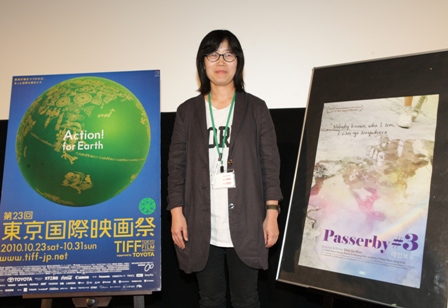
Winds of Asia-Middle East
Red Dragonflies: Q&A @ TOHO CINEMAS ROPPONGI HILLS SCREEN1
Guest: Liao Jiekai(Director/Writer), Ng Xuan Ming(Actress)
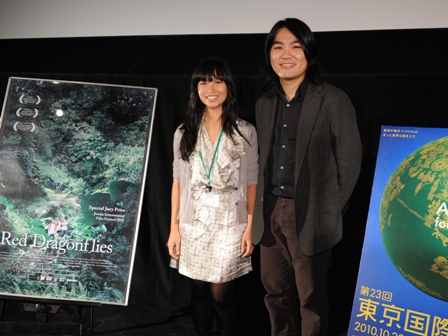
Japanese Eyes
Wandering Home: Q&A @ TOHO CINEMAS ROPPONGI HILLS SCREEN5
Guest: Yoichi Higashi(Director/Screenplay/Editor)
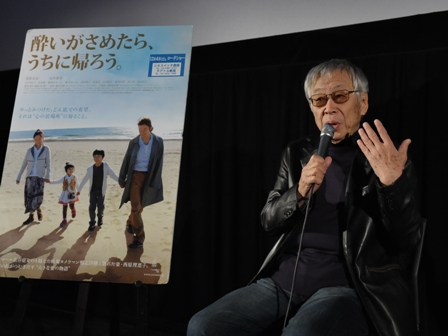
Competition
Sarah's Key: Press Conference @ TIFF movie café
Guest: Gilles Paquet-Brenner(Director/Script)
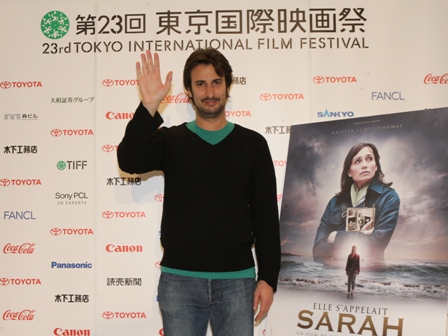
WORLD CINEMA
The Solitude of Prime Numbers: Q&A @ TOHO CINEMAS ROPPONGI HILLS SCREEN7
Guest: Saverio Costanzo(Director/Screenplay), Alba Rohrwacher(Actress)
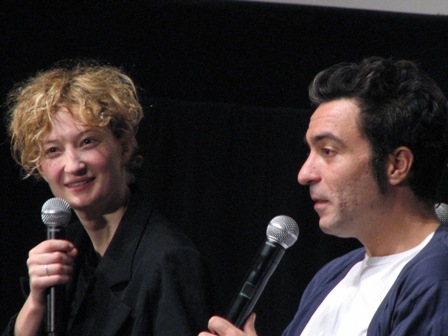
Japanese Eyes
Successional Tradition of Noh: Q&A @ TOHO CINEMAS ROPPONGI HILLS SCREEN6
Guest: Chiseko Tanaka(Producer/Director)
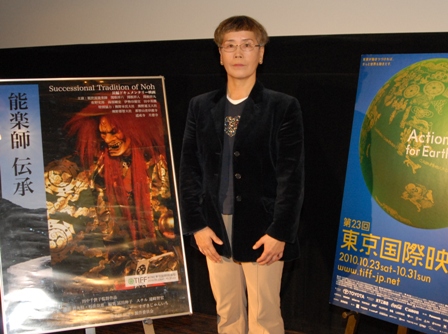
WORLD CINEMA
Hands Up: Q&A @ TOHO CINEMAS ROPPONGI HILLS SCREEN2
Guest: Romain Goupil(Director/Screenplay)
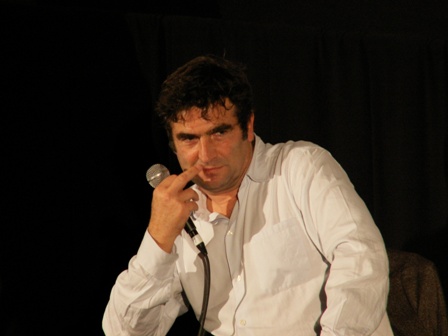
Winds of Asia-Middle East The 70th Anniversary: Bruce LEE to the Future
Gallants: Q&A @ TOHO CINEMAS ROPPONGI HILLS SCREEN5
Guest: Derek Kwok(Director/Screenplay), Clement Cheng(Director/Screenplay)
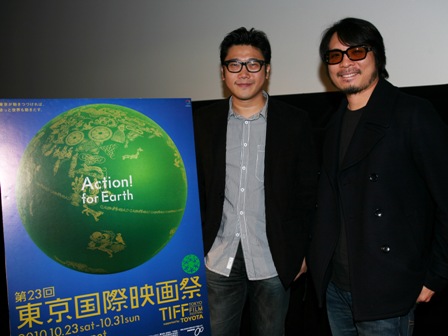
Competition
And Peace on Earth: Q&A @ TOHO CINEMAS ROPPONGI HILLS SCREEN7
Guest: Matteo Botrugno(Director/Screenplay), Daniele Coluccini(Director/Screenplay), Maurizio Tesei(Actor), Simone Isola(Producer)
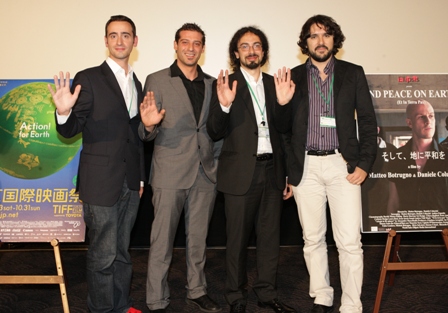
Competition
Buddha Mountain: Press Conference @ TIFF movie café
Guest: Li Yu(Director/Script Writer), Fang Li(Producer/Script Writer), Sylvia Chang(Actress), Chen Po Lin(Actor)
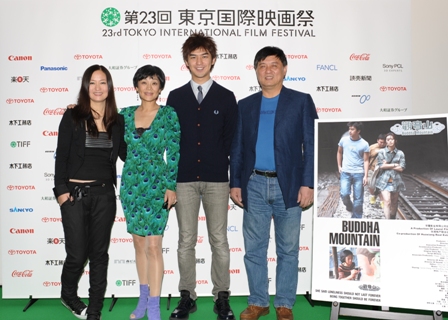

Winds of Asia-Middle East
Ways of the Sea: Q&A @ TOHO CINEMAS ROPPONGI HILLS SCREEN2
Guest: Sheron Dayoc(Director/Writer/Producer), Lilit Reyes(Producer), Maria Isabel Lopez(Actress)
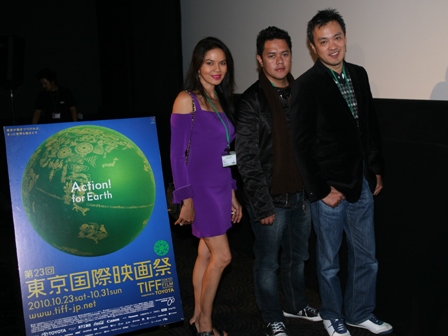
Special Screenings
STONE: Stage Greeting @ TOHO CINEMAS ROPPONGI HILLS SCREEN5
Guest: Teru(Special Guest)ŃĆü"Maria"
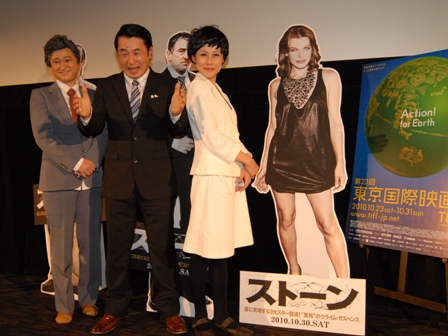
Winds of Asia-Middle East Reha ERDEM: A New Master of the Turkish Cinema
My Only Sunshine: Q&A @ TOHO CINEMAS ROPPONGI HILLS SCREEN3
Guest: Reha Erdem(Director/Writer/Sound Design/Editor)
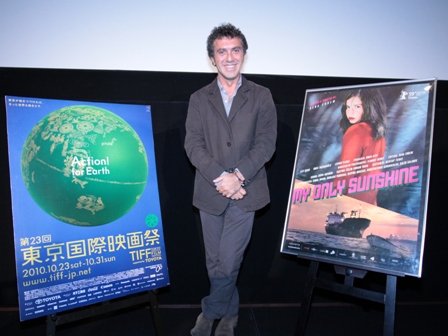
Competition
Brighton Rock: Q&A @ TOHO CINEMAS ROPPONGI HILLS SCREEN7
Guest: Rowan Joffe(Director)
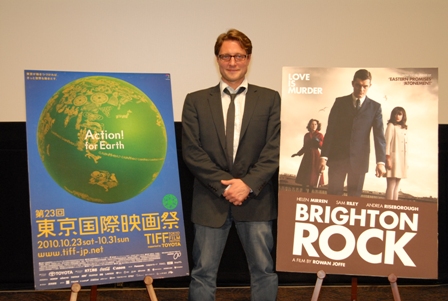
Winds of Asia-Middle East
The Tiger Factory + Inhalation: Q&A @ TOHO CINEMAS ROPPONGI HILLS SCREEN2
Guest: Woo Ming Jin(Director/Producer/Writer), Edmund Yeo(Producer/Writer/Editor)ŃĆüKohei Ando(Professor, Waseda University)
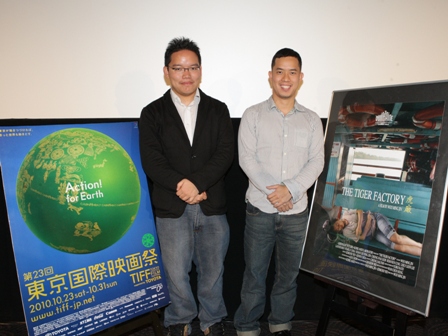
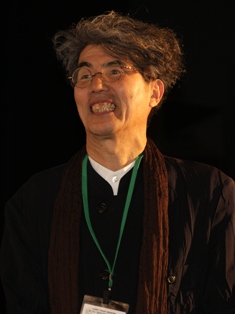
2010.10.26[Interviews]
Winds of Asia ŌĆ£Passerby #3ŌĆØ Interview with Shin Su-won (Director)’╝ł10/26’╝ē


---How far is your own life reflected in the main character, Ji-wan?
I am a homemaker with two children. I left my teaching work in my 30s and went to Korea National University of Arts in 2002. After I graduated, I worked in a film company for a while. I was preparing for a music film before ŌĆ£Passerby #3,ŌĆØ so the scenes in which a band performs in the film are from those days. I have much in common with Ji-wan, but only about a quarter of the story is from my experiences, and the rest are fictional for the film. Ji-wan is also a character I had in mind from the beginning.
However, I also endured the difficulty of making a feature film, just like Ji-wan did. Most of the lines are like my ŌĆ£diaryŌĆØ for the last 10 years.
---The title ŌĆ£Passerby #3ŌĆØ is a keyword in the story. Its cynical implication that a passerby No. 3 is an extra who never plays the leading character flips to have positive meaning in the second half of the story. I understood it as cheer for the women from the ŌĆ£386 generationŌĆØ who are playing increasingly more important roles in society.
I am one of those from the ŌĆ£386 generationŌĆØ, but my priority was to console myself (laughs). But that seems to have helped to gain support and sympathy from the women of the same generation, and I am certain this film will cheer up many people who are struggling to balance work and home.
---The female producer bosses Ji-wan around, demanding her to rewrite the scenario to resemble a blockbuster film. She is the villain in this satire of the film industry, but she, too, is portrayed as one of the working women from a kindly viewpoint.
For a director, a producer is a partner as well as someone to confront. I also experienced that my producer didnŌĆÖt understand me and that I felt bad. I wanted to free myself from such conflicts in this scenario, and wanted to look at it from a higher place.
Producers who work in a huge system of commercial film industry tend to be pushed into being a villain. The producer of ŌĆ£Passerby #3ŌĆØ had a film she wanted to make, but she gets caught up in the system without noticing it. Directors and producers have their own difficulties and worries. Some people were concerned that ŌĆ£Passerby #3ŌĆØ may upset some people in the industry (laughs), but I am relieved that most producers have viewed it favourably.

---In the first half of the story, Ji-wan feels enlightened to see a rainbow reflected on a puddle. After some twists and turns towards the end, she sees another rainbow, this time with her son in the sky, showing a brilliant linkage between the two scenes.
That scene was not in the plan. A real rainbow came up when we were shooting, luckily enough, both characters were on site. We rushed to film them before the rainbow disappeared. We had been very tired in the scorching heat that day, but we were very pleased to have managed it.
---Ji-wan persists on the story of a rock band, and her rebellious son joins a school rock band due to her influence. You are credited to the music, as well as a scrip writer and a producer. Were you a ŌĆ£rock chickŌĆØ?
The music and performance are by a young band, and to be precise, I should be credited for the selection and production of music. I used to like pop music, but I have become a rock fan as I got older. At this rate, I could be a guitarist in my next life (laugh).
When I was a teacher at a junior high school, there was a boy who was very bright but had become a delinquent because of his family circumstances. When I saw him playing in a band at a school festival, I realised he needed a tool to vent his frustrations. Rock music is a good way to sort out teenage frustrations.
---ŌĆ£Passerby #3ŌĆØ has already won the Grand Prix at the Jeonju International Film Festival this year. WhatŌĆÖs your next film?
Investors are reviewing my script at the moment. The theme is music, it is about a youth at a guitar factory.
I have been approached by a major film company to see if I was interested in a ŌĆ£genre filmŌĆØ, but I did not quite understand what they meant (laughs). Regardless how I am involved with films, my priority remains to make a film I would want to watch myself, which is a film to portray a real life.
Passerby #3
Film Information
2010.10.26[Interviews]
Winds of Asia ŌĆ£Hi-SoŌĆØ Interview with Aditya Assarat (Director) 10/26

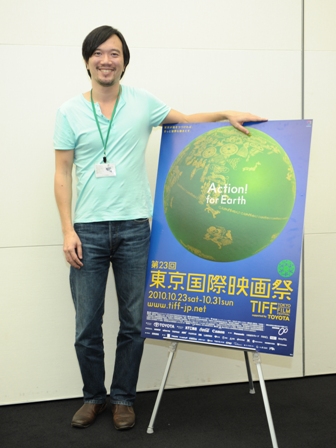
---What motivated you to make ŌĆ£Hi-SoŌĆØ?
In fact, I have been cherishing the idea for 7 or 8 years. It should have been my first film, but I could not raise the funds. It was easier to make ŌĆ£Wonderful TownŌĆØ (in terms of s budget), and I put away this project. But I always wanted to do this sooner or later.
---The main character, who comes back from studying in the U.S. to Thailand to become a film actor, overlaps with you a lot.
I agree 100%. I was a foreigner in the U.S., but I am treated as a foreigner and called American boy in Thailand. I donŌĆÖt feel quite at home anywhere. I am too westernized as an Asian, but too Asian to be a Westerner. I wanted to show this in the film.
--- Gaps slowly develop between the main character and his American girlfriend who comes to Thailand. Did this happen to you?
Yes, exactly. (laughs)
---His relationship with a new Thai girlfriend does not work out either. The script portrays the subtleties of this feeling very well. What did you keep in mind when writing the script?
It consists of two parts, each side corresponds to the other side like a coupled mirror. It is like a love story in an English version and a Thai version. The common concept is that the romantic relationship does not work out in either of the cases.
---It was filmed again in the area which was devastated by the Asian Tsunami in 2004, following {Wonderful Town}. What was your intention?
I was living in Bangkok when it happened. The damage was in southern Thailand so I watched it on TV. When I went to the area a year later, everything was tidied up without any trace. It looked as if nothing had happened, but it cannot be erased from peopleŌĆÖs memory. That gave me the starting point for ŌĆ£Wonderful Town.ŌĆØ I wanted to give some kind of a link between my first and second films, hence ŌĆ£Hi-SoŌĆØ has an actor who comes to act in the area which was hit by the tsunami.

---The last scene at the airport can be interpreted in many ways.
There are a few ways to interpret it, but to me, the significance is that it is at the airport. Airports and hotels are international as well as stateless, a place where people like Ananda, who donŌĆÖt belong to any place, can feel at ease. It a reflection of my life as I have spent a lot of my time at airports and hotels.ŌĆØ
---Do you still feel you are an outsider?
My 70-year-old father was also educated in the U.S. and had a similar upbringing as I have had. My father still says he doesnŌĆÖt feel Thailand is his country. I wonder if that feeling will remain with me for life.
Apichatpong Weerasethakul received the Palme dŌĆÖOr at Cannes this year for the first time for a Thai film. Did you feel inspired?
As someone who makes independent films, I know exactly how significant his achievement is, and it was really inspiring. I have huge respect for him for making films which express will, emotion and persuasion. ŌĆ£
---You seem to have established your style only in your second film. What themes are you interested in for the future?
Building up my career as a film director is in itself a challenge for me, and I have not succeeded yet to make a film that appeals to a wider audience. I donŌĆÖt think I would ever make a film like Tony JaaŌĆÖs which are watched by so many people, but I would like to make a film, in my own style, that would reach out to as many people as possible.
---ItŌĆÖs been two years since you were in Tokyo. Are you enjoying it here?
I love being in Japan. My favourite is the hot springs. I have been to a hot spring twice already.
Assarat acknowledges being a foreigner and faces it head-on through films. His matter-of-fact manner of talking relates to his films, with a glimpse of a firm belief in direction. ŌĆ£Hi-SoŌĆØ will surely spread its wings from Tokyo to the world stage.
Hi-So

2010.10.26[Interviews]
Winds of Asia ŌĆ£JulietsŌĆØ Interview with Hou Chi-jan (Director) 10/26


---I believe the audience was looking forward to seeing the ŌĆ£return of Chen Yu-hsunŌĆØ more than anything in ŌĆ£Juliets,ŌĆØ but the first story you directed exceeded their expectations. I heard that this film is one of Ang Lee and his brother Lee KangŌĆÖs project to assist young Taiwanese film directors. Please tell us a little more about the project.
It was in 2007, there was a plan where Ang Lee would invite script writers from Hollywood and hold a workshop for young Taiwanese film directors. The idea was to complete 6 short scripts for filming at some point later on. However, due to some changes, the workshop did not materialise. But Lee Kang felt sorry about it, chose 3 scripts out of 6 which had been submitted to make them into films as an omnibus film. No common theme was set for the three scripts and it had a different title at the beginning, and it was only after the common motif of ŌĆ£Romeo and JulietŌĆØ was decided that the title was specified as ŌĆ£Juliet.ŌĆØ
---ŌĆ£JulietŌĆÖs Choice,ŌĆØ the first story of ŌĆ£JulietsŌĆØ is a tragic love story which takes place in the 1970s in Taiwan. You are too young to have experienced that period, but why did you choose the 1970s?
I was always interested in Taiwan in the 1970s. I did not experience it myself, but I did my research about that period and I got really attracted to the atmosphere of the time. Taiwan was still under martial law but things were beginning to loosen up compared to the period of White Terror in the 1950s to 1960s. Various cultural activities started to emerge, information control was easing and the atmosphere of society as a whole was peaceful. Compared to the growth of a child, Taiwan was growing up to become an adult in the 1970s.
--- Talking about the 1970s, it was from the end of the 1970s when many crime films were made, which provided motifs for your ŌĆ£Taiwan Black MoviesŌĆØ screened at the TIFF in 2005.
Indeed. I am definitely interested in the 1970s, but outside of that particular era, too, I would like to include various events that represent the time in my films as they provide the background. My other feature film, ŌĆ£One DayŌĆØ (2010), for example, is a love story of a young couple in modern Taiwan. Couples in Taiwan today all face the hurdle of ŌĆ£national service,ŌĆØ and this is a significant element in the film.
---Tell us about the casting of ŌĆ£Juliets.ŌĆØ Vivian HsuŌĆÖs performance has been very well received. Why did you choose her?
Vivian Hsu is regarded as innocent and lovely in both Taiwan and Japan. But in fact she has a strong will as well as being deep and complicated. I wanted to shed light on this side of her which is not given enough attention.
---That was a great success. Vivian was brilliant, but also it was perfect to have Wang Po Chieh, who has attracted attention for ŌĆ£Winds of SeptemberŌĆØ (2008) and ŌĆ£Bodyguards and AssassinsŌĆØ (2009).
Juliet in ŌĆ£Romeo and JulietŌĆØ was older than Romeo. That is why I picked the young Wang Po Chieh. The age difference between the two is 15 years, and it worked out very well.
Juliets

2010.10.26[Interviews]
Competition ŌĆ£Buddha MountainŌĆØ Interview with Li Yu (Director), Sylvia Chang (Actress), Chen Po Lin (Actor) (10/26)


---What prompted you to write this story?
Li Yu (Yu):What was most shocking was the aftermath of the Sichuan earthquake. I was shocked by the number of people died in the earthquake, but the shock was greater when I heard that many survivors killed themselves. There was a man who helped many people, while his 6-year old daughter remained buried. When the rescue operation quietened down a little, he killed himself. He left a note, ŌĆ£Please do not feel sad. I have thought about this and I have done everything I could. You may not understand this but I am happy with my decision.ŌĆØ It was a suicide for the happiness of the soul. There was another fact which shocked me greatly. It was the news that young employees at a computer company were killing themselves one after another. When one commits suicide, someone else follows suit and dies. They are mentally exhausted. I thought there may be a link between the impulse of the youths and the choice of happiness of an elderly person who has lost the meaning of life.

--- How did you cast the roles?
Yu:While I was still writing the script, I was sure that Chang should be played by Sylvia, and that her performance will make this film different from others. I was convinced that SylviaŌĆÖs passion and skill in performance, which has been nurtured during her long career, will convey ChangŌĆÖs emotions precisely. Chen Po Lin was recommended by Sylvia. I searched for a young actor to play Ding Bo, not just in China but in Hong Kong and Taiwan as well, but in vain. Then Sylvia recommended Po Lin to me as he has a good personality and more than anything, he is fresh and clean, which Sylvia said is essential for Ding BO.
---How was it to perform such a difficult role with a heavy theme?
Sylvia Chan (Chan): It was toughest, not when I was acting, but when I could not decide whether to take on the role or not. I have a child myself so I think I can understand the pain of losing a child, but I was not sure if I could sympathize with ChangŌĆÖs choice. I had a talk with the director and I slowly came to accept her choice may be possible. When I watched the finished film, I felt it was not me but Chang that was there. The same goes for Po Lin, Fan Bingbin and Fei Long. I felt we breathed and lived there together.

Chen Po Lin (Chen): My upbringing is completely different from Ding Bo, but I have a friend like him. So I could understand his feeling and empathize with him. I only saw the finished film at the TIFF this time. It was me on the screen, but it was Ding Bo, and watching it made me feel like him again. It was surreal (laughs).

---Do you think the three youths symbolize the angst-filled young generation in the modern time?
Yu:Yes, it is exactly the social issues faced by young people in China, and I portrayed their thorny adolescence. Many graduates are unemployed nowadays. Ding Bo seeks freedom by refusing university entrance exams but only manages an idle life. Many youths in China are in the same situation.
Chang:Living with those three youths, gradually heals the mind of Chang, my character. However, her anguish is different and deeper. She has spent a long time looking for an answer to a life question, and finds it through the interaction with these three youths. It is probably liberation. Each viewer will see the last scene in a different way, but I hope everyone will see it with hope.
---The locations in the grand and breath-taking natural beauty add to the sublime atmosphere effectively.
Yu: The producer is from Sichuan and from an area where a railway runs through, thatŌĆÖs how we found the location. Even so, it took a long time to decide on the location as we had to consider the positions of the mountains to place a temple and the angle of the railway track.
---The scene where the three youths were on the roof of a train was brilliant with an excellent sense of speed. How did you feel?
Chen: It was fun and I felt good. IŌĆÖve never done anything like that. There was a scene shot from a high-angle, and just three of us on the train without any crew. The train kept running and I felt as if we were going somewhere very far away.
---Having experienced this film about some deep worries in life, do you think you have changed in any way?
Chen:When I do something, I tend to think if I am doing it right or what is really important, rather than just to dive in and do it. Also, the director inspired me to do something, and I am writing a comedy script at the moment. I never thought I would want to direct or write a script.
Chang:I feel younger, thanks to the directorŌĆÖs energy (laughs). I might direct a film again in the near future.
A dignified piece of work with a theme of redemption of a soul. The lush green scenery cleanses the anguish of the characters. Popular young star, Chen Po Lin and Fan Bingbing, creating a fresh atmosphere, leaving a nice aftertaste. It is a shame the release of this excellent film is not set in Japan at this moment. Wishing for the release in Japan soon.
Buddha Mountain
Film Information
2010.10.26[Interviews]
Competition ŌĆ£The Invisible EyeŌĆØ Interview with Diego Lerman (Director) and Julieta Zylberberg (Actress) (10/26)


---You were still young during the military dictatorship era, but do you remember anything?
Diego Lerman (Lerman):We were always moving because my parents were involved in the anti-military government movement. Among my relatives, some moved abroad, and some disappeared (killed), and I remember the fear and emotions which cannot be expressed in words. Looking at the pictures I drew in those days, I can see I was drawing what I was feeling in a closed world.

---The original story is ŌĆ£Ciencias MoralesŌĆØ by Martin Kohan. Why did you decide to adapt it to film?
Lerman: I liked it because the story is original and innovative. The dictatorship is portrayed in a method completely different from the conventional way. In addition, I found it interesting that the dictatorship is just a context, not the theme. I liked the allegorical aspect, too, and I was expecting him to write something like this sooner or later.
---In dramatising the story, was there anything you paid particular attention to?
Lerman: The lead character, Maria, is in the world of school, where she is part of the order, but gradually she becomes unable to control her desires, such as having a romantic feeling for one of the pupils. I really wanted to portray that.
---The protagonist shows hardly any emotions. How did you approach the character?
Julieta Zylberberg (Zylberberg): The original story describes her emotional struggle in great detail, which shows the sway of her feelings. For example, she is strict with pupils, but on the other hand, she feels desire towards them. She is an introvert, it was really important to carefully build up the subtle changes over many rehearsals.

---The school in the story still exists. Did you shoot at the school?
Lerman: The headmaster rejected our request to film there. We could not find a suitable location, as that space is really important to show the insignificance of human, and the project almost collapsed. In the end, we were given access to three schools and a part of the Parliament house, and so we somehow completed the filming.
---If the two went to that school, what sort of people do you think they might have turned out to be?
Lerman: You can imagine virtually anything with hindsight, but they would have turned out to be completely different persons.
---Most of the film consists of scenes inside the school, and the social conditions at the time are not shown. Was it intentional?
Lerman: The time is set just before the Falklands War, when opposition against the government was growing and the government was sensing danger. While demonstrations are organized in the outside world, usual life goes on within the closed world of school. I wanted to show the contrast.
---The protagonistŌĆÖs action in the last scene was shocking.
Zylberberg: The ending is different from the original story. I think the release of her mind coexists with her becoming able to take actions against the situation.
Lerman: I would like the viewers to interpret it freely. There is certainly the release, but that scene can be interpreted as a baptism to enter the violent world.
Argentinean films have taken great strides recently, for example, ŌĆ£The Secret in Their EyesŌĆØ winning the Academy Award for best foreign language film. In ŌĆ£The Invisible Eye,ŌĆØ Lerman demonstrated his talent by cutting deep into the negative history of his country, while Zylberberg superbly expressed the subtle emotions. ArgentinaŌĆÖs presence will become a leading nation, not just in the world of soccer but also in the world of film.
The Invisible Eye
ŌåÆFilm Infomation
2010.10.26[Interviews]
Competition ŌĆ£SarahŌĆÖs KeyŌĆØ Interview with Gilles Paquet-Brenner (Director) (10/26)


---How did you learn about the history of Jewish oppression?
I learned about the holocaust at school, but I knew about it from early on because my grandfather was a German Jew and died in a concentration camp. However, there is a big difference between knowing about it and understanding it. I really felt that when I read the original story three and a half years ago. The young generations know about it as part of history, but they donŌĆÖt really understand it. Why the holocaust happened, and how was it implemented? I would like the audience to contemplate on that. This is an issue that also linked to the present time.
---Other films portrayed French Jews under German occupation. What is different in this film?
There were people who collaborated with the Nazis, and this was mentioned in films in the past. However, the French police arrested Jews and transported them to camps, which means the country played a part in the oppression. This is a serious matter. Jacques Chirac revealed this in a speech whilst he was the president, and the people were shocked.
---Did M├®lusine Mayance who played Sarah have an understanding about the war?
She did not know about the war at the beginning, so her parents told her about it. When I met with the holocaust survivors, she came with me and listened to them. She is only 10, so her understanding would be superficial at the moment, but she may have a deeper understanding in a few years.
---How was Kristin Scott Thomas who played the American journalist, Julia?
She does really well if you win her confidence. When you want her to do something in terms of performance, you need to explain the reasons properly. When she is convinced, she will give brilliant performances.

---What did you keep in mind when you were making the film?
Since itŌĆÖs such a heavy theme, I try not to make it too tragic or melodramatic. I wanted the audience to feel as if they are there at the event in 1942. It is not in distant history. I did not want to show the holocaust victims in a big figure, but I wanted to show that individuals suffered. It was fortunate that momentum was also gathering in Spain to shed light on the past when the film was screened at the San Sebastian Film Festival, so it was well understood that SarahŌĆÖs tragedy is not of the past at all but it is affecting the present day. Julia in the film is an American, not a Jew, but she sacrifices her home and everything else to pursue Sarah. The actress, Kristin Scott Thomas, is exactly like that, too. That is the universality of the film. How is Japan facing the past?
Brenner is based in both Paris and Los Angeles. He is French but cosmopolitan, too, and he talks about the importance of universality of being a human being. It overlaps with the heroine who goes round the world to cover stories, but Brenner is happiest when he returns to Paris. ŌĆ£A metropolitan city but a quiet family life is also possible,ŌĆØ that he claims is the charm of Paris.
Sarah's Key
Film Information
2010.10.26[Interviews]
Winds of Asia-Middle East ŌĆ£Memories of a Burning TreeŌĆØ Interview with Sherman Ong (Director) (10/26)


---You started as a photographer, but have you been interested in filmmaking from the beginning?
I started photography in my teens. I was given a camera as a present, so I started with taking photos of pets and gradually moved on to people. I got hold of a video camera when I was at university and started making movies. I have been interested in images, moving or not. I did not go to a film school, so I learned about films by watching them in theatres. I volunteered selling tickets at film festivals and watched various films from around the world, and thatŌĆÖs how I started my film studying. In the beginning I was engrossed in watching any film, but then I started to look for my own style. You might be able to have a glance at my ŌĆ£film pedigreeŌĆØ in my works. I made my first feature film, ŌĆ£Hashi,ŌĆØ when I was researching at Fukuoka Asian Art Museum. I was there to research photographs and films from an artistŌĆÖs point of view. I developed my own way of making films in Japan. I had to think how to make films on a limited budget, and I started working with non-professional actors. It is interesting to make films within these constraints.
---Similarly to ŌĆ£Hashi,ŌĆØ you filmed ŌĆ£Memories of a Burning TreeŌĆØ on locations far away from your country. Do you think the Malaysian multi-ethnicity in your background may have helped feeling reasonably at home when you film in foreign countries?
ŌĆ£Memories of a Burning TreeŌĆØis set in the Tanzanian capital of Dar es-Salam and the climate is just like in Southeast Asia. It was just like in Indonesia and I was comfortable. I filmed in Fukuoka, too, but the difference between Japan and Indonesia is bigger than the difference between Africa and Indonesia. For example, if you are meeting with someone, it is common for the person to be late by about 45 minutes to an hour. So you make an appointment for 14:15, so that you will meet at 15:00. ItŌĆÖs like that in Jakarta or Malaysia.

---Do you mean the time flows differently?
Yes, the time stretches and contracts. They call it ŌĆśelastic timeŌĆÖ in Malaysia. The African way of talking is similar to the Asians. Dar es-Salam was an African slave-trading port in the past. The Arabs started slave trade and the Westerners took it over.
---Most of your films are shot using just one shot for each scene, and the sense of time is also intriguing.
The shot length is shorter this time than the previous film, and itŌĆÖs more like video clips on MTV. I am heavily influenced by Andrei Tarkovsky. A long moving shot is his characteristic, but I had to shot with a Taiwanese new wave method. I set up a camera on a tripod and got the actors to perform, like Yasujiro OzuŌĆÖs style. I shot from an ordinary angle using a 50mm standard lens. I believe this can direct the audienceŌĆÖs attention to what is happening on the screen better. I realized this when I was taking photographs. News photos use wide lens to emphasise the distance, but with standard lens, the audience can look this way and that to look at the detail.
---So you use 50mm lens. Does the 50mm on film give different depth on screen to 50 mm on digital?
This camera (Canon EOS 5D Mark II) is a full frame, so the sense of perspective is not much different at all from shooting on 35mm film. I can shoot just like on film with this lens. I tend to take pictures with great depth and most come out fine.
---The interaction between the person in the foreground and background on the screen is interesting.
ThatŌĆÖs exactly what I want. I did some shooting myself, so I set the camera at the beginning to make sure all the scope I want is within the frame, and then focused on direction.
---Yes, I got the impression that the camera was placed at the right places.
It may be to do with the traditional tableau in painting.
---It reminded me of the tableau-like direction in silent movies in the 1910s.
I am really interested in the filming technique in those early days. You can see both the space and the characters.
---You have worked with non-professional actors for your three films so far.
I have one actor for this film. He is studying acting at college. He is the only one with basic acting training. Others expressed themselves based on their life training to live their lives. For example, there is a 15-year old girl in the film, and she has had 15 yearsŌĆÖ training in her life. Her behaviour tells a story, and this cannot be learned at school.
---So you did not provide acting lessons to non-professional actors?
We just have one or two rehearsals, but I set aside time for an interview at the beginning. I found out about their family, etc., and wrote the script based on the information. For example, I arranged events they have experienced in their lives to make them more dramatic. For example, there is a character in the film who looks for his motherŌĆÖs grave. He lost his mother because of malaria in real life. I asked him to write a letter to his dead mother. I did not use the letter in the film because it is a private letter. There is a scene where a cleaner is reading a letter, and thatŌĆÖs the letter he wrote. I wanted to keep private things as private.
---A good decision. If you had used the letter, it would have been vulgar.
His letter was actually very touching. However, if I used it, it would have been too much. We all have lost someone we cared about, so we can imagine how he was feeling when he wrote the letter, without showing what he wrote in it. Yasujiro OzuŌĆÖs films are like that, too. A good thing about Japanese films is that they do not show what is readily. It must be a common sensitivity among most Asians.
---How many crew members did you have?
Myself and four others. An assistant director and interpreter, a recording staff and his assistant, and a continuity staff.
---Do you always work with a small number of crew?
I try to keep it compact. When I shot in Fukuoka, it was only myself, an interpreter, and a curator from an art gallery. The curator checked if the lines were OK. It was a very small crew, in a Taiwanese New Wave style.
---In the last scene, the Malaysian song on the radio is touching.
During the opening, a woman talks about her dream of becoming a radio personality. She turns her dream into reality at the end. I wanted to end the film with a Malaysian song and I found that on the internet. It is a song for the Sikh God, and it is about new creation. I thought it suits the film. The lyrics are very interesting. It talks about some sort of idealism. There are many religions in Malaysia and they are intolerant to each other in some way. Accepting a religion is not the same as being tolerant to a religion. The Malaysian government focuses on the difference between religions rather than finding similarities, and I think there is a problem there. I am always very interested in mixing up various things.
---You are putting it into practice by going to various countries and making films.
I must be doing it subconsciously. I have travelled Vietnam, Indonesia, Japan, Singapore, and Tanzania . I am planning to shoot my next film finally in Malaysia.
---What sort of a film are you planning next?
I have two projects. One is a dance movie, which has been asked by the Singapore Arts Festival. The other is my own project. I am planning to make a film about Chinese Malaysian with the fund I received from the Rotterdam International Film Festival. This one is not urgent, so I will take time to make it.
Memories of a Burning Tree
Film Information
2010.10.26[Interviews]
Winds of Asia ŌĆ£The Tiger FactoryŌĆØ and ŌĆ£InhalationŌĆØ Interview with Woo Ming Jin (Director:ŌĆ£The Tiger FactoryŌĆØ) and Edmund Yeo (Director:ŌĆ£InhalationŌĆØ) (10/26)

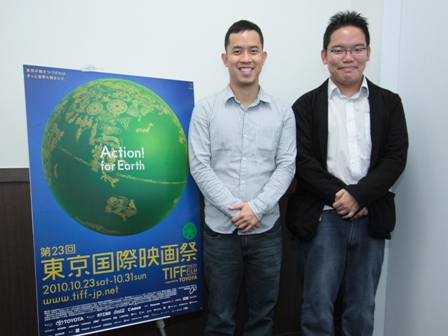
---The film shocked me. The two girlsŌĆÖ wishing to go to Japan for a better future broke my heart. I heard the film is based on real incidents in Malaysia.
Woo Ming Jin (Ming Jin): I read a case about someone who got arrested for selling babies, which gave me the initial idea. I also heard stories that some illegal immigrants take passage on the ship which transport Japanese car parts.

---Are these cases happening for real?
Ming Jin: I donŌĆÖt think cases like these girls are many. However, ignorant girls from the countryside may be deceived to believe in the fortune they could make in a few years in Japan. Britain is a popular destination, too, but Japan is the most popular in Asia, partly because of the strength of yen.
Edmund Yeo (Yeo): JapanŌĆÖs image in Asia is very good. People believe in the ŌĆ£rosy JapanŌĆØ through films and TV dramas and they get the idea into their head that things will work out once they get there.
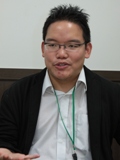
---What are they watching?
Yeo: Most animations have been dubbed into Chinese or Malaysian in the Japan boom since the early 1990s. ŌĆ£Doraemon,ŌĆØ ŌĆ£Dragon Ball,ŌĆØ TV dramas by Kimutaku, etc., you can watch a Japanese anime or TV drama every week, although not so for films.
---This film is a collaboration between the Graduate School of Global Information and Telecommunication Studies at Waseda University and Kohei Ando Laboratory, and you are still at the laboratory, Mr. Yeo?
Yeo: I have been at Ando Laboratory for about two and a half years. My previous short film, ŌĆ£KingyoŌĆØ (screened at Venice International Film Festival), was also co-produced by Ando Laboratory, so I took my project again to him to pick his brains.
---I thought the film threw the audience into the girlsŌĆÖ situation and let them have the experience, rather than describing the girlsŌĆÖ situations and emotions. The quiver of the hand-held camera created the realistic feeling as well as showing the anxiety of the girls.
Ming Jin: We valued the realistic feeling. We went for the impromptu filming. Characterisation was left to the actors who projected themselves into their characters. What we see on the film was almost like what the girls experience for the first time.
---Are the two girls professional actors?
Ming Jin: The actress in ŌĆ£The Tiger FactoryŌĆØ is a professional, but she has only been a supporting actress. She is still fresh, and I asked her to act instinctively and be herself.
Yeo: The girl in ŌĆ£InhalationŌĆØ has studied acting somewhere, but she is an amateur. I saw her in ŌĆ£The Tiger FactoryŌĆØ and thought she was interesting, thatŌĆÖs why I put her in the leading position. She is an actress with a realistic feel.
Ming Jin: The mean woman in ŌĆ£The Tiger FactoryŌĆØ is the actress who was in Tsai Ming-LiangŌĆÖs ŌĆ£I DonŌĆÖt Want To Sleep Alone.ŌĆØ
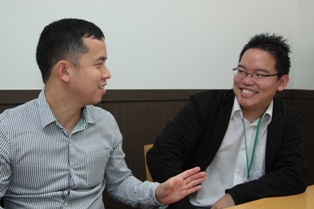
---What is your plan for the next film?
Yeo: It was edited at the same time as ŌĆ£Inhalation,ŌĆØ but I have another short film called ŌĆ£Exhalation,ŌĆØ which was shot in Japan. It is about death and loss, starring Tomoe Shinohara and Kiki Sugino. It will be screened at the Dubai International Film Festival in December.
Ming Jin: I am working on a splatter horror in Malaysia, as well as ŌĆ£The Book KeeperŌĆØ which has been entered in TPG (*1).
The Tiger Factory + Inhalation
ŌåÆFilm Infomation




